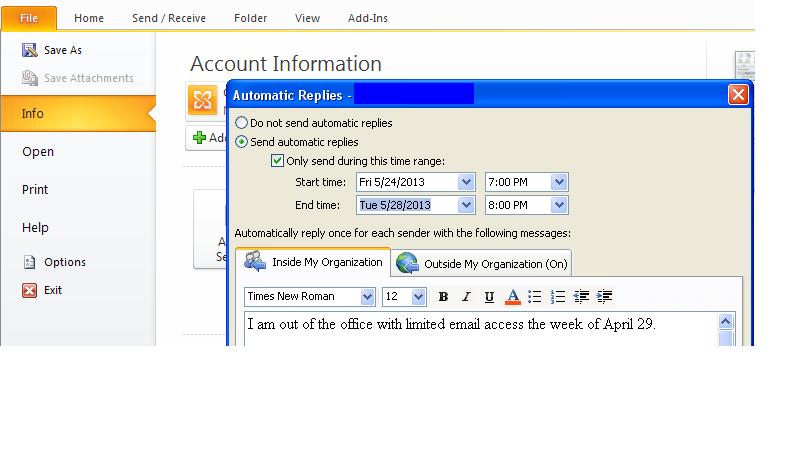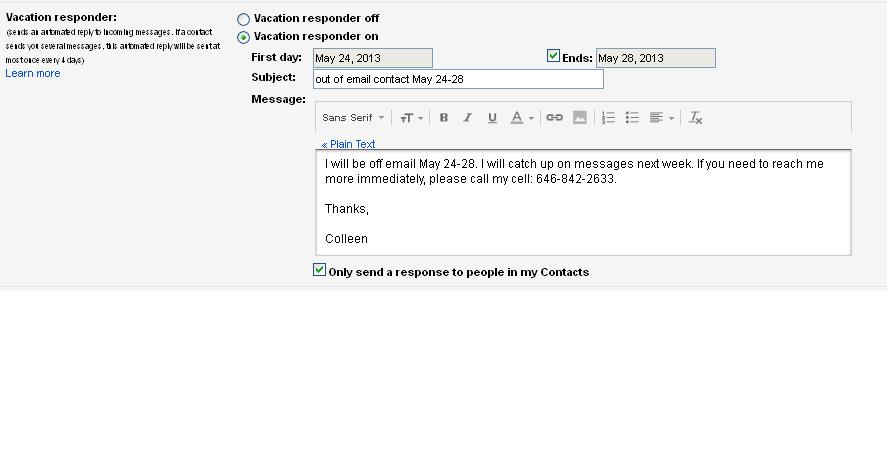With Memorial Day coming up, the summer vacation season is approaching.
Why WHY do you bother with an autoresponder email that says something like, “I will be away April 12-19.” ?
OK. That’s good to know. But what do I do now? Especially if I have an issue that can’t wait?
Here are my thoughts on a good out-of-office message that communicates to your customers that you care about them even when you’re away:
1. Tell me how long you will be away.
Sometimes you might not know. Maybe it’s a family emergency and it’s unclear how long it’ll take to resolve.
Instead of just saying, “I am away from the office,” either give dates or say something like “I am away from the office indefinitely” or “I am away from the office; my return date is not firmed up yet.”
Otherwise, start and end dates help me figure out if I want to wait or find a plan B.
2. Tell me if you’re checking messages and if so, how often.
If you’re traveling for work and doing your best to handle business matters remotely, that’s different from hiking Kilimanjaro.
Maybe you could say, “I am traveling for work and checking email intermittently. My responses might take longer than normal. ” or “I will check messages each evening.”
That is, unless you are off completely, in which case it might be “I will not have access to email while I am away.”
3. Tell me who can help me while you are away.
If you have a great assistant who can triage all your customer and coworker needs, maybe you just instruct everyone to email your assistant instead. Or just forward your emails while you’re away.
But if that’s not the case, provide a name, maybe a title and contact info for the person handling your responsibilities. If that’s several people depending on the need, list them all.
For example, “If you have a question about an order, contact Bonnie in customer support at XXX-XXX-XXXX or bonnie@yourcompany.com. If you need to pay a bill, contact Steve in accounts payable at XXX-XXX-XXXX or steve@yourcompany.com. If you need a copy of a past bill, contact Ellen in records at XXX-XXX-XXXX or ellen@yourcompany.com.”
4. Consider different messages for coworkers versus those outside your company
Your customers and vendors might need different levels of detail or different instructions about who to contact than your colleagues.
Outlook allows you to craft two different out of office messages, so if you’d like to use internal phone numbers and describe where your assistant sits, you can do that for internal recipients without confusing people who don’t work with you.
For those outside your company, please include your signature file — I might not remember why I contacted you in the first place so a little refresher on who you are might be useful.

5. Remember to turn off your message when you come back.
In many cases, you can set start and stop dates for your message before you even leave. But if you either can’t or don’t do that, leave yourself a reminder note to change your voice mail and turn off your out-of-office email responder when you get back.

Incidentally, I think the same rules apply for your voicemail greeting when you’re away: tell me how long you will be out, if I should expect to hear back from you or if I should contact someone else instead, and make sure you turn it off when you get back.
Bonus tip: I know a guy who as a rule sets his out-of-office messages to say he’ll be away one day longer than he actually is. That gives him a day to catch up without anyone expecting to hear back from him.
Related articles
- Entrepreneur Alert – Automate Your Inbox (thelegalstandard.wordpress.com)
- Need to Know Information on Hotmail Autoresponder (email.answers.com)
- Five Helpful Suggestions On Autoresponders (socialpoweredcontent.com)
- How to Transform Your Email into a Productivity Tool (news.terra.com)
- The Good Qualities And Disadvantages Of An Autoresponder Company (socialpoweredcontent.com)
- 3 ‘out of office’ replies we never want to see again
- The Art of the Out of Office Email
- How to write an effective out of office message

